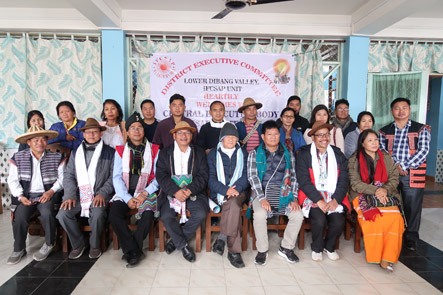[Karyir Riba]
ROING, 17 Feb: The Lower Dibang Valley (LDV) district unit office of the Indigenous Faith & Cultural Society of Arunachal Pradesh (IFCSAP) was inaugurated by IFCSAP president Katung Wahge at Cheta-I here on Thursday.
Wahge, along with other executive members of the IFCSAP, offered prayers to Ini Maselo Zinu (Idu-Mishmi deity) before heading to an interaction session with the IFCSAP LDV district unit members.
Wahge informed that the IFCSAP was founded in 1999, and expressed sorrow that the body could not make an impact on the society even after 23 years of existence.
“Decisions are taken inside a room and fail to reach the public. We should get in touch with the public to make the movement successful and garner public support,” he said.
He further said that the rapid rate of conversion in some communities is alarming. “At this rate, there might be total conversion in the next 4-5 years. What is also alarming is that, in some places, people are being paid certain monthly honorarium for converting. This practice should be checked,” he said.
“Alongside the 3 Ps – protect, preserve and promote – we should also add ‘practice’ to our tradition and culture. At the same time, we should also be open to merge and change with time, and adapt with the changes. Festivals should be celebrated with less funds, and most of it should be used for research and documentation,” he said.
District IFCSAP president Abayu Saya apprised the executive members of the present situation of the district unit. He also stressed on establishing a khumu (prayer centre) in the district, and provision of honorarium for the igus (shamans) from the state government.
Advisor Dr Ista Pulu commended the IFCSAP for its work in protecting, promoting and preserving the indigenous faith and culture.
“RIWATCH, with which I have been associated for a long time now, also shares the same concept. Shamans play the most important role in our community, from one’s birth to death. Sadly, they are diminishing in number. The government’s initiative to take up preservation of shamanism is appreciable. Proper utilization of funding is of utmost importance,” he said, and added that “although a khumu is important, it shouldn’t dilute our traditional systems but go side by side.”
Women’s wing vice president Lily Pertin said, “Local festivals should be celebrated in the most traditional ways. It shouldn’t be only about ornaments and attire but should be conducted like how our ancestors did”.
She informed that there are 12 ganggings (prayer centres) in LDV but only three are functional “as the remaining are in dire need of funding for renovation.”
The Idu Mishmi Cultural and Literary Society’s (IMCLS) literary secretary Dr Razzeko Dele spoke about the apex body’s work on preservation and promotion of shamanism.
“The Idu Mishmi shaman fellowship programme is a pilot project of the IMCLS, manned by its sub-committee, Igu preservation and documentation project partner. We are in the process of making shamans. The project is being funded by the Nature Conservation Foundation and the IMCLS. We are also working on documentation of shamanism in both written and audio forms,” he informed.



